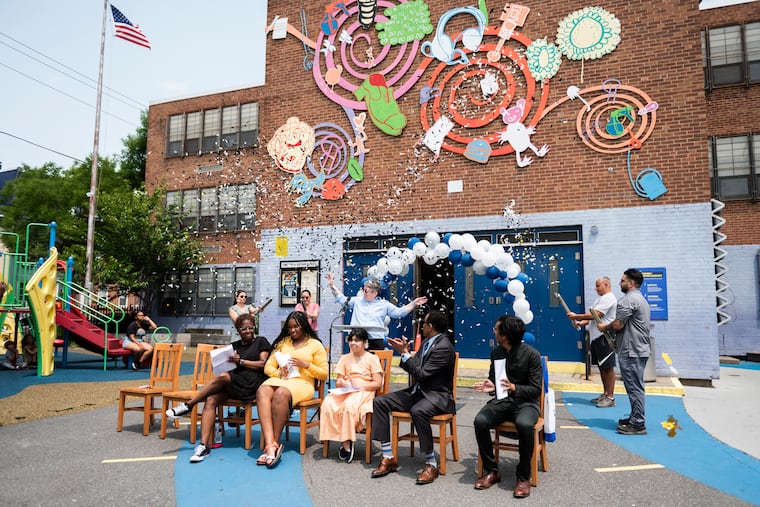This Philly school is on a short list to be named ‘best in the world’ for nearly eradicating out-of-school suspensions
Chester Arthur, at 20th and Catharine, was shortlisted along with schools in Malaysia, Wales, India, South Africa, Uruguay, Brazil, and Florida.

Chester A. Arthur School has been shortlisted for a global prize that recognizes schools deemed “best in the world.”
Arthur, at 20th and Catharine in Southwest Center City, was named one of the top 10 schools around the world for its work “supporting healthy lives” through a restorative-practices approach to conflict resolution in a competition sponsored by T4 Education, a United Kingdom-based organization. The other finalists are schools in Malaysia, Wales, India, South Africa, Uruguay, Brazil, and Florida.
The Arthur school community celebrated the news with balloons, speeches, and confetti cannons on the playground Thursday.
Arthur, a K-8 with 300 students, has virtually eliminated out-of-school suspensions by turning to an approach that relies not on reactive discipline but on students solving conflicts themselves, equipped with tools to talk out problems, acknowledge harm done, and make plans for restoration.
Mary Libby, the school’s principal, initiated the shift when she arrived at Arthur four years ago. Libby has a background in restorative practices, and thought they could make a world of difference at Arthur. It’s not about turning a blind eye to problems, but handling them head-on, she said.
Arthur has a dedicated restorative room, daily all-school meetings for social and emotional skill building, and community partnerships that focus on mindfulness, coping skills, and other essential mental health topics.
“I believe this approach can serve as a promising practice that can be shared worldwide,” Superintendent Tony B. Watlington Sr. said at the Arthur celebration Thursday.
Before the turn to restorative practices, Mahari Bligen, now a rising eighth grader, said her class “had a lot of problems” and personal conflicts, and didn’t always handle them in the most productive way.
Now, with a lot of help from the school’s counselor and other adults, “we’ll all sit together and talk about how we feel, and work it out,” Mahari said. “It works.”
Parent Courtney Wolk, a child psychiatrist and mental health researcher, said the approach was crucial.
“The past few years, with the pandemic especially, have made what has always been a challenging job even more difficult for our educators, and it’s made it harder to be a kid,” said Wolk. “The staff at Arthur and the families in the Arthur community have just risen to the challenge and shown us day in and day out how resilient they are.”
Sandra Lawrence, an Arthur staffer, said the change was “almost magic.”
“When conflicts arise, we seek restoration rather than punitive punishments,” Lawrence said. “Oftentimes, when students are in these meetings, they leave differently.”
It’s not lost on Libby how big a deal the honor is, especially at a diverse, underresourced Philadelphia public school where most students are from economically disadvantaged households. Arthur, like many schools, had been steeped in a “traditional discipline” mind-set for many years.
“It was certainly a process,” said Libby. “People are accustomed to consequences — even the word consequences — being a negative.”
The winners of the T4 prize will be named in the fall; five winning schools will split $250,000.
If Arthur wins, Libby said the school would broaden its restorative approach with BRIDGE, Bridging Mental Health and Education in Urban Schools, a research-based program that works to address and prevent conflict in city schools.